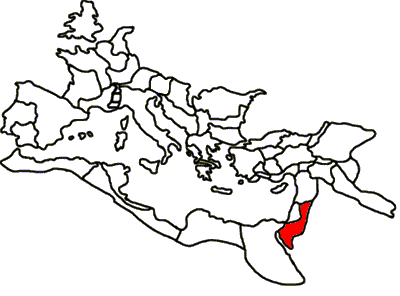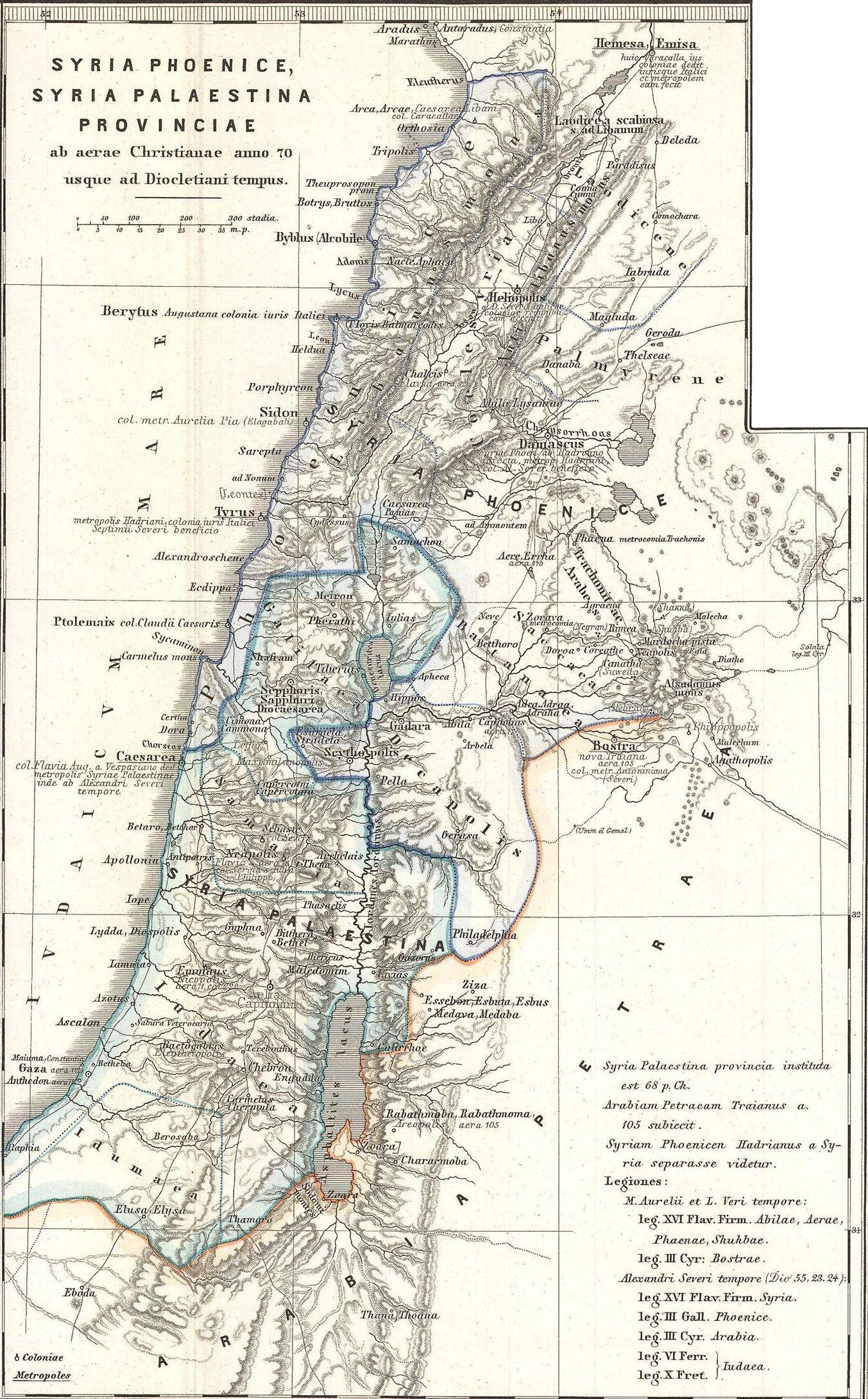|
Athenion (general)
Athenion was a military commander of the Egyptian queen Cleopatra in Coele-Syria in the late 30s BC. Life Athenion is only known through the report given by the Jewish historian Josephus on Herod the Great. But the account of Josephus is very hostile to Cleopatra and reflects in this connection the negative reporting of the memoirs of the Jewish king on the Ptolemaic queen, which found their way via Nicolaus of Damascus into the historic works of Josephus. Therefore, Josephus’ unreliable reporting on Cleopatra has to be evaluated carefully. When in 32 BC the preparations for the final war between Mark Antony and Octavian were beginning Herod wanted to come to Antony's rescue with an army, but was sent back by Antony to fight against Malichus, king of the Nabataeans, instead. According to Josephus Cleopatra is said to have been responsible for this decision of the triumvir, but the German classical scholar Christoph Schäfer does not believe that this is true. After Herod had ... [...More Info...] [...Related Items...] OR: [Wikipedia] [Google] [Baidu] |
Cleopatra
Cleopatra VII Philopator ( grc-gre, Κλεοπάτρα Φιλοπάτωρ}, "Cleopatra the father-beloved"; 69 BC10 August 30 BC) was Queen of the Ptolemaic Kingdom of Egypt from 51 to 30 BC, and its last active ruler.She was also a diplomat, naval commander, linguist, and medical author; see and . A member of the Ptolemaic dynasty, she was a descendant of its founder Ptolemy I Soter, a Macedonian Greek general and companion of Alexander the Great. writes about Ptolemy I Soter: "The Ptolemaic dynasty, of which Cleopatra was the last representative, was founded at the end of the fourth century BC. The Ptolemies were not of Egyptian extraction, but stemmed from Ptolemy Soter, a Macedonian Greek in the entourage of Alexander the Great."For additional sources that describe the Ptolemaic dynasty as " Macedonian Greek", please see , , , and . Alternatively, describes them as a "Macedonian, Greek-speaking" dynasty. Other sources such as and describe the Ptolemies a ... [...More Info...] [...Related Items...] OR: [Wikipedia] [Google] [Baidu] |
Antiquities Of The Jews
''Antiquities of the Jews'' ( la, Antiquitates Iudaicae; el, Ἰουδαϊκὴ ἀρχαιολογία, ''Ioudaikē archaiologia'') is a 20-volume historiographical work, written in Greek, by historian Flavius Josephus in the 13th year of the reign of Roman emperor Flavius Domitian which was around AD 93 or 94.Freedman, David Noel, ed., ''The Anchor Bible Dictionary'', (New York: Doubleday, 1997, 1992). ''Antiquities of the Jews'' contains an account of the history of the Jewish people for Josephus' gentile patrons. In the first ten volumes, Josephus follows the events of the Hebrew Bible beginning with the creation of Adam and Eve. The second ten volumes continues the history of the Jewish people beyond the biblical text and up to the Jewish War, or the First Jewish–Roman War, 66 to 73 CE. This work, along with Josephus's other major work, '' The Jewish War'' (''De Bello Iudaico''), provides valuable background material for historians wishing to understand 1st-century A ... [...More Info...] [...Related Items...] OR: [Wikipedia] [Google] [Baidu] |
Ptolemaic Generals
Ptolemaic is the adjective formed from the name Ptolemy, and may refer to: Pertaining to the Ptolemaic dynasty *Ptolemaic dynasty, the Macedonian Greek dynasty that ruled Egypt founded in 305 BC by Ptolemy I Soter * Ptolemaic Kingdom Pertaining to a certain ancient writer *Relating to Ptolemy, 2nd-century AD geographer and astronomer/astrologer *Ptolemaic system In astronomy, the geocentric model (also known as geocentrism, often exemplified specifically by the Ptolemaic system) is a superseded description of the Universe with Earth at the center. Under most geocentric models, the Sun, Moon, stars, an ..., a geocentric model of the universe developed in detail by the astronomer Claudius Ptolemaeus See also * Ptolemy (name) {{disambig ... [...More Info...] [...Related Items...] OR: [Wikipedia] [Google] [Baidu] |
Ulrich Wilcken
Ulrich Wilcken (December 18, 1862 – December 10, 1944) was a German historian and papyrologist who was a native of Stettin. Biography Wilcken studied ancient history and Oriental studies in Leipzig, Tübingen and Berlin. He was a disciple of historian Theodor Mommsen (1817–1903), who encouraged Wilcken to take a position as cataloguer of papyri following graduation. Mommsen was also instrumental in Wilcken succeeding Eduard Meyer (1855–1930) as associate professor of ancient history at the University of Breslau in 1889. Afterwards, he was a professor at the universities of Würzburg (from 1900), Halle (from 1903, where he was again a successor to Eduard Meyer), Leipzig (from 1906) and Bonn (from 1912), where he succeeded Heinrich Nissen (1839–1912). Later on, he served as a professor at Munich (from 1915) and Berlin (from 1917), where he was successor to Otto Hirschfeld (1843–1922). Wilcken was a German pioneer of Greco-Roman papyrology, and is credited for amassing an ... [...More Info...] [...Related Items...] OR: [Wikipedia] [Google] [Baidu] |
Michael Grant (author)
Michael Grant (21 November 1914 – 4 October 2004) was an English classicist, numismatist, and author of numerous books on ancient history. His 1956 translation of Tacitus's '' Annals of Imperial Rome'' remains a standard of the work. Having studied and held a number of academic posts in the United Kingdom and the Middle East, he retired early to devote himself fully to writing. He once described himself as "one of the very few freelancers in the field of ancient history: a rare phenomenon". As a populariser, his hallmarks were his prolific output and his unwillingness to oversimplify or talk down to his readership. He published over 70 works. Biography Grant was born in London, the son of Col. Maurice Grant who served in the Boer War and later wrote part of its official history. Young Grant attended Harrow and read classics (1933–37) at Trinity College, Cambridge. His speciality was academic numismatics. His research fellowship thesis later became his first published bo ... [...More Info...] [...Related Items...] OR: [Wikipedia] [Google] [Baidu] |
Qanawat
Qanawat ( ar, قَنَوَات, Qanawāt) is a village in Syria, located 7 km north-east of al-Suwayda. It stands at an elevation of about 1,200 m, near a river and surrounded by woods. Its inhabitants are entirely from the Druze community. According to the Syria Central Bureau of Statistics (CBS), Qanawat had a population of 8,324 in the 2004 census. History Qanawat is one of the earliest cities in the Bashan and Hauran areas. It is probably evidenced in the Hebrew Bible as Kenath (Hebrew: קְנָת, , ). Possible earlier evidence, is from Ancient Egyptian documents like the execration texts (second group) of the 20th-19th century BC, and the Amarna letters of the 14th century BC (as Qanu, in EA 204). Hellenistic and Roman history The ancient Hellenistic-Roman city of Canatha (also Kanatha, Κάναθα in Ancient Greek), is mentioned for the first time in the reign of Herod the Great (1st century BC), when Nabatean Arab forces defeated a Jewish army. It rema ... [...More Info...] [...Related Items...] OR: [Wikipedia] [Google] [Baidu] |
The Jewish War
''The Jewish War'' or ''Judean War'' (in full ''Flavius Josephus' Books of the History of the Jewish War against the Romans'', el, Φλαυίου Ἰωσήπου ἱστορία Ἰουδαϊκοῦ πολέμου πρὸς Ῥωμαίους βιβλία, ''Phlauiou Iōsēpou historia Ioudaikou polemou pros Rōmaious biblia''), also referred to in English as ''The Wars of the Jews'', is a book written by Josephus, a first-century Roman-Jewish historian. It has been described by Steve Mason as "perhaps the most influential non-biblical text of Western history". Content Divided into seven books, it opens with a summary of Jewish history from the capture of Jerusalem by the Seleucid ruler Antiochus IV Epiphanes in 168 BC to the first stages of the First Jewish–Roman War (Book I and II). The next five books detail the unfolding of the war, under Roman generals Vespasian and Titus, to the death of the last Sicarii. The book was written about 75 AD, originally in Josephus' "pat ... [...More Info...] [...Related Items...] OR: [Wikipedia] [Google] [Baidu] |
Nabataeans
The Nabataeans or Nabateans (; Nabataean Aramaic: , , vocalized as ; Arabic: , , singular , ; compare grc, Ναβαταῖος, translit=Nabataîos; la, Nabataeus) were an ancient Arab people who inhabited northern Arabia and the southern Levant. Their settlements—most prominently the assumed capital city of Raqmu (present-day Petra, Jordan)—gave the name ''Nabatene'' ( grc, Ναβατηνή, translit=Nabatēnḗ) to the Arabian borderland that stretched from the Euphrates to the Red Sea. The Nabateans emerged as a distinct civilization and political entity between the 4th and 2nd centuries BCE,Taylor, Jane (2001). ''Petra and the Lost Kingdom of the Nabataeans''. London: I.B.Tauris. pp. 14, 17, 30, 31. . Retrieved 8 July 2016. with their kingdom centered around a loosely controlled trading network that brought considerable wealth and influence across the ancient world. Described as fiercely independent by contemporary Greco-Roman accounts, the Nabataeans were ann ... [...More Info...] [...Related Items...] OR: [Wikipedia] [Google] [Baidu] |
Coele-Syria
Coele-Syria (, also spelt Coele Syria, Coelesyria, Celesyria) alternatively Coelo-Syria or Coelosyria (; grc-gre, Κοίλη Συρία, ''Koílē Syría'', 'Hollow Syria'; lat, Cœlē Syria or ), was a region of Syria in classical antiquity. It probably derived from the Aramaic word for all of the region of Syria, but it was most often applied to the Beqaa Valley between the Lebanon and the Anti-Lebanon mountain ranges. The area is now part of the modern-day Syria and Lebanon. Name It is widely accepted that the term Coele is a transcription of Aramaic ''kul'', meaning "all, the entire", such that the term originally identified ''all'' of Syria.A History of the Jews and Judaism in the Second Temple Period, Volume 2, Lester L. Grab ... [...More Info...] [...Related Items...] OR: [Wikipedia] [Google] [Baidu] |
Augustus
Caesar Augustus (born Gaius Octavius; 23 September 63 BC – 19 August AD 14), also known as Octavian, was the first Roman emperor; he reigned from 27 BC until his death in AD 14. He is known for being the founder of the Roman Principate, which is the first phase of the Roman Empire, and Augustus is considered one of the greatest leaders in human history. The reign of Augustus initiated an imperial cult as well as an era associated with imperial peace, the '' Pax Romana'' or '' Pax Augusta''. The Roman world was largely free from large-scale conflict for more than two centuries despite continuous wars of imperial expansion on the empire's frontiers and the year-long civil war known as the "Year of the Four Emperors" over the imperial succession. Originally named Gaius Octavius, he was born into an old and wealthy equestrian branch of the plebeian ''gens'' Octavia. His maternal great-uncle Julius Caesar was assassinated in 44 BC, and Octavius was named in Cae ... [...More Info...] [...Related Items...] OR: [Wikipedia] [Google] [Baidu] |
Mark Antony
Marcus Antonius (14 January 1 August 30 BC), commonly known in English as Mark Antony, was a Roman politician and general who played a critical role in the transformation of the Roman Republic from a constitutional republic into the autocratic Roman Empire. Antony was a relative and supporter of Julius Caesar, and served as one of his generals during the conquest of Gaul and the Civil War. Antony was appointed administrator of Italy while Caesar eliminated political opponents in Greece, North Africa, and Spain. After Caesar's assassination in 44 BC, Antony joined forces with Marcus Aemilius Lepidus, another of Caesar's generals, and Octavian, Caesar's great-nephew and adopted son, forming a three-man dictatorship known to historians as the Second Triumvirate. The Triumvirs defeated Caesar's killers, the ''Liberatores'', at the Battle of Philippi in 42 BC, and divided the government of the Republic between themselves. Antony was assigned Rome's eastern provinces, in ... [...More Info...] [...Related Items...] OR: [Wikipedia] [Google] [Baidu] |





